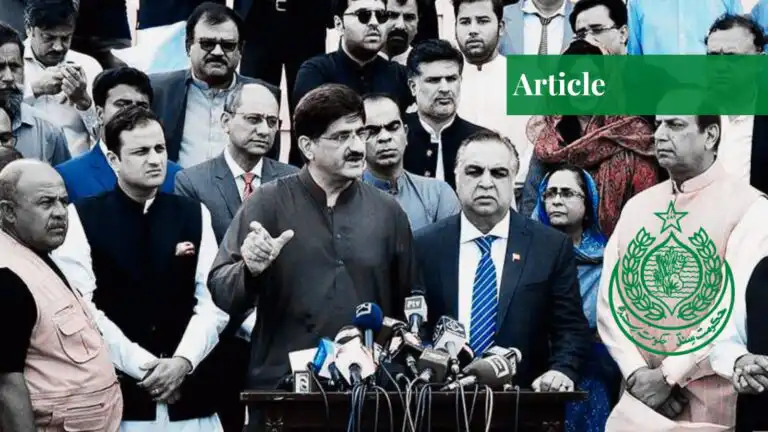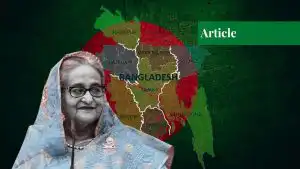Sindh is the second largest province of Pakistan, though ruled by the so-called democratic party, Pakistan Peoples Party, along with the support of powerful and influential families, holding large acres of land, influence in politics, dictates bureaucracy, and overrides law enforcement agencies. These thirty-plus families or feudal dynasties have ruled over the masses under the cloak of democracy, turning it into a personal fiefdom or enterprise. Their dominance spreads from police to the courts, and from local administration to the provincial and national assemblies of the country.
Pakistan People’s Party has been governing Sindh for the last 18 years uninterruptedly, which chants the slogans of democracy but safeguards the 30-plus big families that have taken the public hostage through application of various methods; intimidation, threatening and torturing, systematic tactics; using police and the local administration, and surprisingly cultural manipulation; wearing Sindhi topi and ajrak. Ultimately, power has remained in the hands of these big families, entitled to their tribes as sardars, waderas, and landlords, treating districts as personal fortresses where no one can challenge their writ, and impunity; citizens as their slaves or petty lifeless subjects, who have no basic rights or freedom in their fortresses.
The 30-plus families are the Bhuttos, Zardaris, Talpurs, Jatos, Shahs, Mahars, Magsis, Chandios, Bhiranis, Jakhranis, Shirazis, Jamalis, Shoras, Bhayos, Khuhros, Abbassis, Abros, Lunds, Shaikhs, Memons, Ghabols, Legharis, Wassans, Dharejos, Soomros, Maliks, Siyals, Junejos, and many others. Among these families, either one bigwig is sitting in the provincial or another in the national assemblies. Shockingly, their next generations or pampered sons are trained to inherit their father’s political and social legacies. Supposedly, the Information Minister in the present Sindh cabinet, Sharjeel Inam Memon’s son Rawal Sharjeel, runs all political and social activities on his father’s behalf in Hyderabad with no official position, dictating to the local administration, police, and other government officials.
Moreover, the local government minister, Nasir Hussain Shah’s son Khumail Hyder Shah, the Chairman of Sukkur, is more powerful than anyone in the city, controlling the local administration, even the high-ups, including the Deputy Commissioner and the Deputy Inspector General of Police bow down to his orders.
When Power Bends Justice
In 2021, the ruthless torture and killing of Nazim Jokhio depicted the stark reality of functioning power and privilege in Sindh. Jokhio, a villager from Malir District of Karachi, recorded and confronted the foreign guests, who were hunting the bird houbara bustard illegally, which was allegedly facilitated by PPP MPA Jam Owais. His act of recording a video cost him his life. Reportedly, he was brutally tortured to death inside the MPA’s farmhouse. Despite public outcry and evidence, the case was systematically deteriorated, reflecting how police, political authority, and prosecution bow down to the influential person, coming from one of these big families Jokhio tribe.
Likewise, in May 2024, Nasarullah Gadani, a journalist from Mirpur Mathelo District, Ghotki, was shot to death after taking the powerful political family, MNA Khalid Khan Lund, to task. Reports and eyewitnesses show the connection of murder to his family, especially his sons, yet justice remains unserved. Due to political pressure, the state institutions’ silence is being observed clearly.
Such cases are not isolated ones; they basically expose the institutional capture in Sindh. From the local administration to law enforcement forces, the system safeguards the law violators and punishes the whistleblowers.
Police and Public Administration: Instruments of Control
In many parts of Sindh, Police, from check-post in-charge to Senior Superintendent of Police (SSP), pay their allegiance to the powerful political families, because they manipulate transfers and postings to bring them under their thumb. Police act as personal guards of these feudal families instead of maintaining law and order situation and those who question them are booked in fake cases, bullied, and even face deadly consequences.
In the kachi-abadi of Ghotki, where, for decades, the dacoits have been operating with full freedom, involved in kidnappings, robberies, murders, and threats under the nose of law enforcement agencies. Dawn News has disclosed the nexus between the Police and these criminal networks in its report, called ‘The Unholy Nexus’, where the Police officers expose each other to escape the action in the ex-MPA-attack case, blaming each other for having ties with the criminal gangs. Thus, these criminal networks have not existed for decades with such impunity without the consent of the police.
Additionally, public administration, as the main organ of local governance, has become another tool of control. Development funds, land records, welfare programs, and documentation are distributed through political affiliations or connections, reaffirming patron-client dependency. Public servants who resist the feudal lords or political families’ influence are transferred or punished by being sent from their home province to another province. At the same time, those who comply enjoy promotions, privileged postings, and protection.
The Courts and the Collapse of Blind Justice
The judicial system often prostrates before these earthly Gods; the process of justice is throttled before it begins, from tampered investigations to intimidated witnesses. Many victims’ families withdraw cases or go out of court settlements, reflecting that people lose confidence in the judicial process. The message is loud and clear: justice is a privilege for the powerful, not a basic right for the poor; it is also a violation of the Constitution’s Article 10-A, which ensures equality before the law and the right to a fair trial.
As it has been seen in the murder case of Nazim Jokhio, PPP’s MPA Jam Owais and his four servants were acquitted in the torture murder of activist Nazim Johkio after both parties acknowledged the out-of-court settlement. And the State has observed the deep silence over it, not even gone for a review petition.
Democracy as a Shield
As the Pakistan Peoples Party’s leadership claims to represent the will of the masses, yet Sindh’s democracy has become a feudal oligarchy; Its survival depends upon the alliances with these 30-plus families. They provide vote banks in elections in exchange for state patronage, political freedom, and judicial protection.
This unholy pact between the Pakistan Peoples Party, along with the feudal families, has corroded the social and political fabric of Sindh. Journalists, social activists, and other free voices are silenced, marginalised, or eliminated. Resultantly, democracy survives in name and slogans only, whereas the feudalist-cum political 30-plus families prosper, progress, and grow politically and socially, wearing the cloak of democracy.
A System in Shackles
The brutal murders of Nazim Jokhio and Nasraullah Gadani mirror the nexus between the ruling party backed by state institutions and the powerful families in Sindh. Wherein, corrupt politicians are immune to accountability, land reforms are a distant dream, and institutional independence is compromised; thus, Sindh and its people will suffer the blows of “so-called democracy” that only provides its service for its masters and minions.
Sindh merits a system based on justice, true democracy, accountability, and independence. Where no influential person or big lord coming from these families goes scot free, if they commit a crime, they should be brought to justice irrespective of their affiliation, influence, and power.
If you want to submit your articles and/or research papers, please visit the Submissions page.
To stay updated with the latest jobs, CSS news, internships, scholarships, and current affairs articles, join our Community Forum!
The views and opinions expressed in this article/paper are the author’s own and do not necessarily reflect the editorial position of Paradigm Shift.
Imran Sattar is a journalist with his Master's in Journalism from IBA Karachi.






